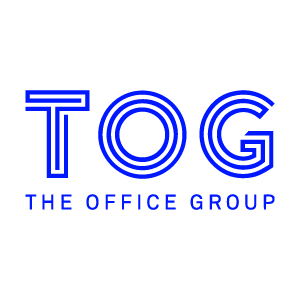Building a UK property empire
Co-founders and co-CEOs Olly Olsen and Charlie Green made their first real estate investments as The Office Group (TOG) in 2003. Close to Angel Islington in London, one of them included a 5,000 square feet property. It eventually became dwarfed by other office buildings in their portfolio – some are 20 times larger today.
Though focused on growing their property portfolio, Olsen says Green wanted to hold on to the Angel property for “sentimental reasons”. The building’s limited size restricted non-tenant functionality such as meeting-room access. So embracing their scale-up focus, they sold it.
From the start, they’ve championed supply in the fast-evolving shared workplace market to home London’s fast-expanding start-up and scale-up communities. Aware of their tenants’ demand for fair-priced, good-quality and flexible office stock, they’ve delivered what the market wants, says Olsen.
Initially adopting a freehold-property model, Olsen says that their “buildings have a lower cost of occupation and so we could charge our clients less”. Its model generated the rental income and capital appreciation that they’ve used to fund growth.
Offering value-added real estate
Their value-added focus has always integrated sustainable credentials like garden spaces, bike parks, recycled materials and water management systems. And supporting local communities through employment opportunities, says Olsen.
Sustainability in real estate was a nascent theme when they set up TOG. So their forward-looking strategy soon cemented their reputation, opening doors to innovative capital partners.
Mission-driven venture capital investor Bridges Community Ventures backed the company in 2003 thanks to TOG’s demonstrable green and social credentials.
“We really cared about the way we were operating and running our buildings,” says Olsen, “which fitted in with Bridges’ approach.”
Attracting more capital and know-how
When the co-CEOs courted investment again in 2010, it was clear that investors were just as interested in their reputation and human capital as their real estate assets, he says.
Following a deal with investor Sir Lloyd Dorfman – the Travelex Group founder – the real estate company was reaching new heights.
“Sir Lloyd Dorfman was a catalyst for today’s success because he pointed us in the right direction,” says Olsen. “He invested money, enabled us to flourish, and connected us with business leaders across the UK.”
The partnership years with Sir Lloyd Dorfman created “a platform and business with experience that enabled us to do the deal with Blackstone”, says Olsen. The June 2017 Blackstone acquisition of TOG valued the business at £500m.
Quality businesses tend to succeed. With a good track record, the right reputation and impressive performance, he says, companies can access debt and equity capital.
The day that we are not joint CEOs is the day the business takes a different direction.
Olly Olsen, The Office Group
Remaining committed co-CEOs
If they’d built a business slowly with leasehold properties then they could have taken a different scale-up route of retaining more equity ownership of the business, says Olsen. “But Charlie and I were not focused on percentage shareholding,” he explains.
The committed co-CEO model continues, even if their equity holdings have been diluted. “Charlie and I always intend to be joint-CEOs,” says Olsen. “But the day that we are not joint-CEOs is the day the business takes a different direction.”
